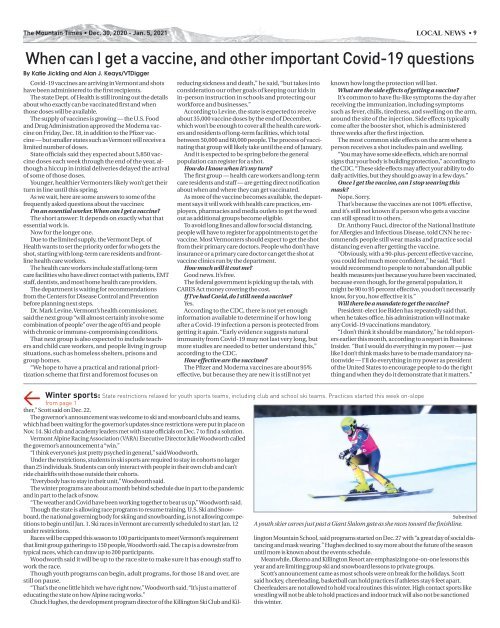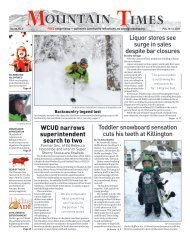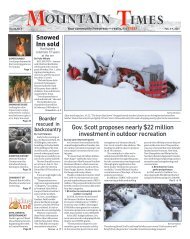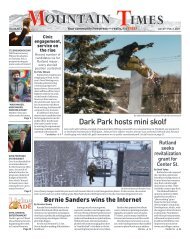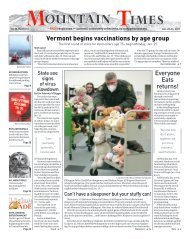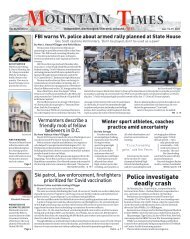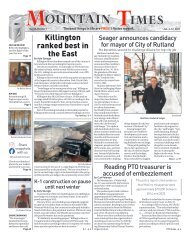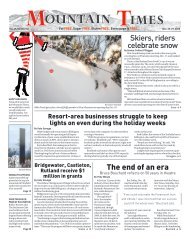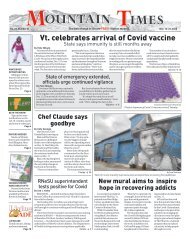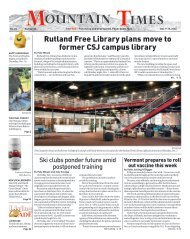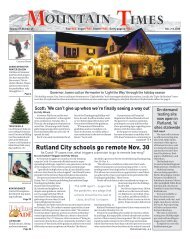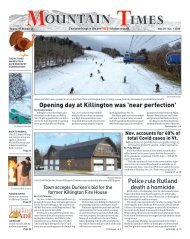Mountain Times - Vol. 49, No. 53 - Dec. 30, 2020 - Jan 2, 2021
Create successful ePaper yourself
Turn your PDF publications into a flip-book with our unique Google optimized e-Paper software.
The <strong>Mountain</strong> <strong>Times</strong> • <strong>Dec</strong>. <strong>30</strong>, <strong>2020</strong> - <strong>Jan</strong>. 5, <strong>2021</strong> LOCAL NEWS • 9<br />
When can I get a vaccine, and other important Covid-19 questions<br />
By Katie Jickling and Alan J. Keays/VTDigger<br />
Covid-19 vaccines are arriving in Vermont and shots<br />
have been administered to the first recipients.<br />
The state Dept. of Health is still ironing out the details<br />
about who exactly can be vaccinated first and when<br />
those doses will be available.<br />
The supply of vaccines is growing — the U.S. Food<br />
and Drug Administration approved the Moderna vaccine<br />
on Friday, <strong>Dec</strong>. 18, in addition to the Pfizer vaccine<br />
— but smaller states such as Vermont will receive a<br />
limited number of doses.<br />
State officials said they expected about 5,850 vaccine<br />
doses each week through the end of the year, although<br />
a hiccup in initial deliveries delayed the arrival<br />
of some of those doses.<br />
Younger, healthier Vermonters likely won’t get their<br />
turn in line until this spring.<br />
As we wait, here are some answers to some of the<br />
frequently asked questions about the vaccines:<br />
I’m an essential worker. When can I get a vaccine?<br />
The short answer: It depends on exactly what that<br />
essential work is.<br />
<strong>No</strong>w for the longer one.<br />
Due to the limited supply, the Vermont Dept. of<br />
Health wants to set the priority order for who gets the<br />
shot, starting with long-term care residents and frontline<br />
health care workers.<br />
The health care workers include staff at long-term<br />
care facilities who have direct contact with patients, EMT<br />
staff, dentists, and most home health care providers.<br />
The department is waiting for recommendations<br />
from the Centers for Disease Control and Prevention<br />
before planning next steps.<br />
Dr. Mark Levine, Vermont’s health commissioner,<br />
said the next group “will almost certainly involve some<br />
combination of people” over the age of 65 and people<br />
with chronic or immune-compromising conditions.<br />
That next group is also expected to include teachers<br />
and child care workers, and people living in group<br />
situations, such as homeless shelters, prisons and<br />
group homes.<br />
“We hope to have a practical and rational prioritization<br />
scheme that first and foremost focuses on<br />
reducing sickness and death,” he said, “but takes into<br />
consideration our other goals of keeping our kids in<br />
in-person instruction in schools and protecting our<br />
workforce and businesses.”<br />
According to Levine, the state is expected to receive<br />
about 35,000 vaccine doses by the end of <strong>Dec</strong>ember,<br />
which won’t be enough to cover all the health care workers<br />
and residents of long-term facilities, which total<br />
between 50,000 and 60,000 people. The process of vaccinating<br />
that group will likely take until the end of <strong>Jan</strong>uary.<br />
And it is expected to be spring before the general<br />
population can register for a shot.<br />
How do I know when it’s my turn?<br />
The first group — health care workers and long-term<br />
care residents and staff — are getting direct notification<br />
about when and where they can get vaccinated.<br />
As more of the vaccine becomes available, the department<br />
says it will work with health care practices, employers,<br />
pharmacies and media outlets to get the word<br />
out as additional groups become eligible.<br />
To avoid long lines and allow for social distancing,<br />
people will have to register for appointments to get the<br />
vaccine. Most Vermonters should expect to get the shot<br />
from their primary care doctors. People who don’t have<br />
insurance or a primary care doctor can get the shot at<br />
vaccine clinics run by the department.<br />
How much will it cost me?<br />
Good news. It’s free.<br />
The federal government is picking up the tab, with<br />
CARES Act money covering the cost.<br />
If I’ve had Covid, do I still need a vaccine?<br />
Yes.<br />
According to the CDC, there is not yet enough<br />
information available to determine if or how long<br />
after a Covid-19 infection a person is protected from<br />
getting it again. “Early evidence suggests natural<br />
immunity from Covid-19 may not last very long, but<br />
more studies are needed to better understand this,”<br />
according to the CDC.<br />
How effective are the vaccines?<br />
The Pfizer and Moderna vaccines are about 95%<br />
effective, but because they are new it is still not yet<br />
known how long the protection will last.<br />
What are the side effects of getting a vaccine?<br />
It’s common to have flu-like symptoms the day after<br />
receiving the immunization, including symptoms<br />
such as fever, chills, tiredness, and swelling on the arm,<br />
around the site of the injection. Side effects typically<br />
come after the booster shot, which is administered<br />
three weeks after the first injection.<br />
The most common side effects on the arm where a<br />
person receives a shot includes pain and swelling.<br />
“You may have some side effects, which are normal<br />
signs that your body is building protection,” according to<br />
the CDC. “These side effects may affect your ability to do<br />
daily activities, but they should go away in a few days.”<br />
Once I get the vaccine, can I stop wearing this<br />
mask?<br />
<strong>No</strong>pe. Sorry.<br />
That’s because the vaccines are not 100% effective,<br />
and it’s still not known if a person who gets a vaccine<br />
can still spread it to others.<br />
Dr. Anthony Fauci, director of the National Institute<br />
for Allergies and Infectious Disease, told CNN he recommends<br />
people still wear masks and practice social<br />
distancing even after getting the vaccine.<br />
“Obviously, with a 90-plus-percent effective vaccine,<br />
you could feel much more confident,” he said. “But I<br />
would recommend to people to not abandon all public<br />
health measures just because you have been vaccinated,<br />
because even though, for the general population, it<br />
might be 90 to 95 percent effective, you don’t necessarily<br />
know, for you, how effective it is.”<br />
Will there be a mandate to get the vaccine?<br />
President-elect Joe Biden has repeatedly said that,<br />
when he takes office, his administration will not make<br />
any Covid-19 vaccinations mandatory.<br />
“I don’t think it should be mandatory,” he told reporters<br />
earlier this month, according to a report in Business<br />
Insider. “But I would do everything in my power — just<br />
like I don’t think masks have to be made mandatory nationwide<br />
— I’ll do everything in my power as president<br />
of the United States to encourage people to do the right<br />
thing and when they do it demonstrate that it matters.”<br />
Winter sports: State restrictions relaxed for youth sports teams, including club and school ski teams. Practices started this week on-slope<br />
><br />
Submitted<br />
A youth skier carves just past a Giant Slalom gate as she races toward the finishline.<br />
from page 1<br />
ther,” Scott said on <strong>Dec</strong>. 22.<br />
The governor’s announcement was welcome to ski and snowboard clubs and teams,<br />
which had been waiting for the governor’s updates since restrictions were put in place on<br />
<strong>No</strong>v. 14. Ski club and academy leaders met with state officials on <strong>Dec</strong>. 7 to find a solution.<br />
Vermont Alpine Racing Association (VARA) Executive Director Julie Woodworth called<br />
the governor’s announcement a “win.”<br />
“I think everyone’s just pretty psyched in general,” said Woodworth.<br />
Under the restrictions, students in ski sports are required to stay in cohorts no larger<br />
than 25 individuals. Students can only interact with people in their own club and can’t<br />
ride chairlifts with those outside their cohorts.<br />
“Everybody has to stay in their unit,” Woodworth said.<br />
The winter programs are about a month behind schedule due in part to the pandemic<br />
and in part to the lack of snow.<br />
“The weather and Covid have been working together to beat us up,” Woodworth said.<br />
Though the state is allowing race programs to resume training, U.S. Ski and Snowboard,<br />
the national governing body for skiing and snowboarding, is not allowing competitions<br />
to begin until <strong>Jan</strong>. 1. Ski races in Vermont are currently scheduled to start <strong>Jan</strong>. 12<br />
under restrictions.<br />
Races will be capped this season to 100 participants to meet Vermont’s requirement<br />
that limit group gatherings to 150 people, Woodworth said. The cap is a downsize from<br />
typical races, which can draw up to 200 participants.<br />
Woodworth said it will be up to the race site to make sure it has enough staff to<br />
work the race.<br />
Though youth programs can begin, adult programs, for those 18 and over, are<br />
still on pause.<br />
“That’s the one little hitch we have right now,” Woodworth said. “It’s just a matter of<br />
educating the state on how Alpine racing works.”<br />
Chuck Hughes, the development program director of the Killington Ski Club and Killington<br />
<strong>Mountain</strong> School, said programs started on <strong>Dec</strong>. 27 with “a great day of social distancing<br />
and mask wearing.” Hughes declined to say more about the future of the season<br />
until more is known about the events schedule.<br />
Meanwhile, Okemo and Killington Resort are emphasizing one-on-one lessons this<br />
year and are limiting group ski and snowboard lessons to private groups.<br />
Scott’s announcement came as most schools were on break for the holidays. Scott<br />
said hockey, cheerleading, basketball can hold practices if athletes stay 6 feet apart.<br />
Cheerleaders are not allowed to hold vocal routines this winter. High contact sports like<br />
wrestling will not be able to hold practices and indoor track will also not be sanctioned<br />
this winter.


